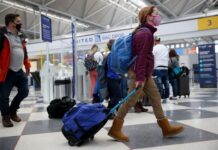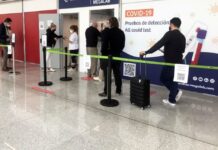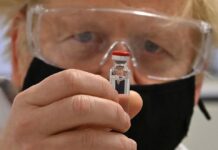AS MORE PEOPLE GET vaccinated against the coronavirus, travel and other activities are expected to rebound, raising questions about how to prove inoculation and so-called “vaccine passports.”
It’s been over a year since the World Health Organization declared COVID-19 a pandemic. And while average daily cases in the U.S. are still hovering at a high number – nearly 60,000 per day – there are signs that some individuals are ready to travel again, despite pleadings from the Centers for Disease Control and Prevention to stay put.
The Transportation Security Administration has documented over 1 million airport screenings every day for the past 18 days. It’s the longest streak since the pandemic was declared. The CDC currently recommends that fully vaccinated individuals refrain from nonessential travel, though agency officials plan to update that guidance.
A vaccine passport system has been suggested for activities like attending concerts or going into the workplace. But its biggest influence could come from encouraging tourists to resume trips, providing a massive boon to a travel industry that has suffered dramatic losses during the pandemic. However, experts say the idea faces several concerns that are difficult to addres
What is a ‘Vaccine Passport?’
Vaccine passports are not a new idea. Frequent international travelers might be familiar with vaccine cards, which are typically a yellow paper showing a persons’ vaccinations. Certain areas require proof of vaccination against illnesses like yellow fever or tuberculosis.
President Joe Biden in January issued an executive order directing agencies to assess the feasibility of linking coronavirus vaccinations to vaccine cards, also known as “international certificates of vaccination or prophylaxis,” and producing a digital version.
Andy Slavitt, a senior adviser to the White House coronavirus team, said on Monday that it’s not the role of the government to create such a passport or hold that kind of data on its citizens. Still, the Biden administration is involved in the efforts and will provide guidance to the private sector on the topic.
Slavitt described the ideal coronavirus passport as free, equitable, secure, accessible in multiple languages and available both digitally and on paper.
Experts have questioned whether a coronavirus vaccine passport needs to be different from the vaccine card system already in place.
“I honestly don’t think there’s a need for it to be a separate thing,” says Henry Raymond, an epidemiologist and associate professor at the Rutgers School of Public Health. He adds that the vaccine is not a free pass to get out of wearing a mask.
Studies are underway to understand whether vaccinated people can become infected asymptomatically and transmit the virus to others, so health officials preach caution in decision-making until they are completed.













